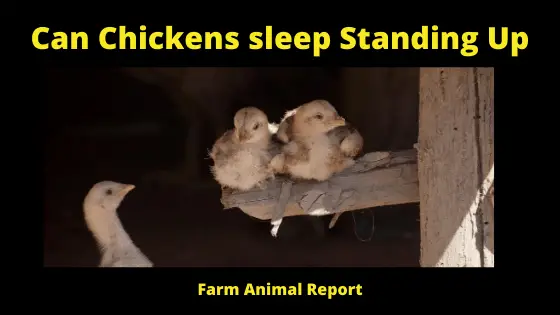As a general rule Chickens Sleep while they are perching. While standing and perching may appear similar, they are different things. Perching is relaxing in an elevated position, and this is the safest and most comfortable way for them to get their required rest. It is not uncommon to see wild chickens sleeping on treetops at night.
Do Chickens Sleep Standing Up / Chickens Normally Sleep in a Perched Position?
Do Chickens Sleep Standing Up? Chickens are interesting birds and have their unique way of living in which distinguishes them from other birds and pets. But when there is a question about the sleeping behavior of hen, there are many questions. Chickens Sleep while they are perching. While standing and perching may appear similar, they are different things. Perching is relaxing in an elevated position, and this is the safest and most comfortable way for them to get their required rest. Chickens are Prey animals, the elevation adds to their safety.
Check Out Amazon for Educational Resources for Breeding Chickens
Whether you own some chickens and have questioned whether they are standing during sleep, or if you have observed what chickens do to sleep, This will Help.
Can Chickens Sleep Standing Up / Chicken Sleeping Patterns?
Both wild and domestic chickens have the same sleeping patterns. When chickens are not active, naturally, they sleep; even feral chickens in the wild snooze. This is even more likely on hot and mild days. They establish roosting areas and are safer when they are elevated from the ground. As such, it is not uncommon to see wild chickens sleeping on treetops at night.
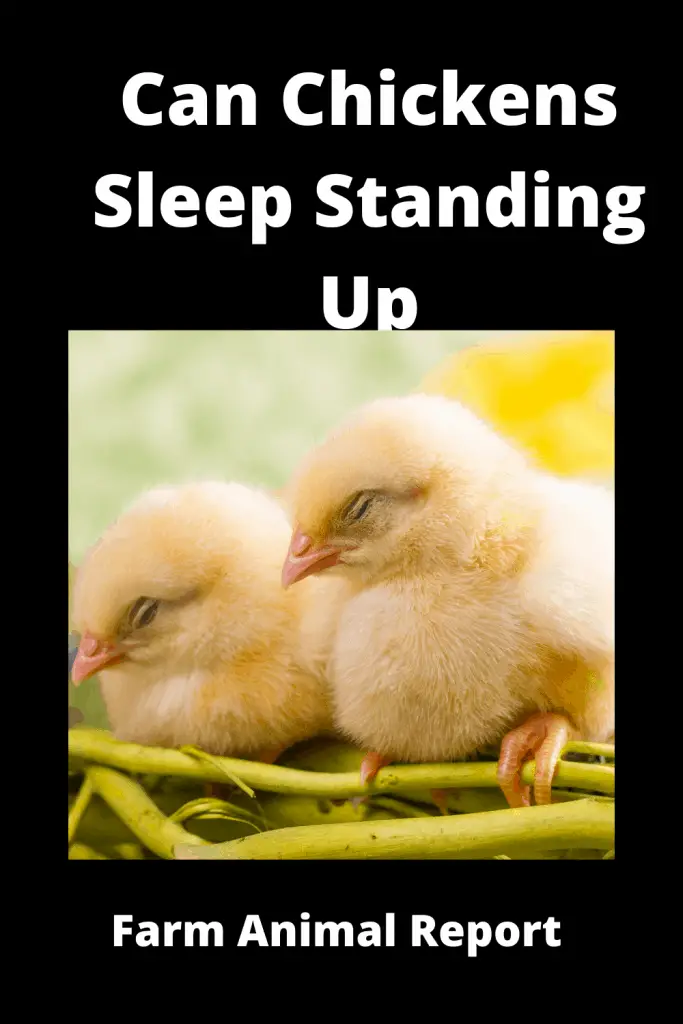
Chickens are aware of the fact that they are prey animals. They know if they allow themselves to shut down and go into a state of deep sleep that they are more vulnerable to predators. Because of this incredible self-awareness, chickens prefer to perch than lie down when they sleep. This is different from standing.
Perching is relaxing in an elevated position, and this is the safest and most comfortable way for them to get any rest, sleep.
12 Ways to Make Money by Chicken Farming—Extensive Guidelines for Chicken Farmers
The majority of chicken owners will purchase a perch to place in their coops. There are excellent cost-effective options.
Sleeping Chickens – An intriguing fact about chickens is that once they discover a cozy place to perch every night, they label it as their preferred spot. They are smart birds and will often return to that spot if they have roamed around for an extended period of the day.
So, when you place a new perch in your coop, it may take a few days for them to work it out and begin using it. However, your chickens will be very appreciative of the fact that they now have a dedicated place to rest.
Some chickens sleep in a very awkward position, but there is no right way for chickens to sleep. If you are concerned about your bird or birds resting in a strange position, then all you need to do is to look at their general well-being to see if there is a problem. As long as they are active, not losing weight, and egg production is going well, there is usually nothing to worry about.
Fascinatingly, chickens sleep in a row like a pattern; the chickens on the outside will close the eye facing the other chickens on the inside leaving the eye facing out open. The chickens in the center of the formation will close both eyes. The chicken on the outside are looking out for predators, and it is safe to say that they take turns.
Where Do Chickens Prefer to Sleep?
Chickens in the wild, like to sleep high perched on tree branches where predators cannot get them, and they are likely to sleep with lots of other chickens as they feel safest this way.
Domestic chickens are not much different; they likely to perch themselves high up from the ground on a stick or branch; this is what you called a roost.
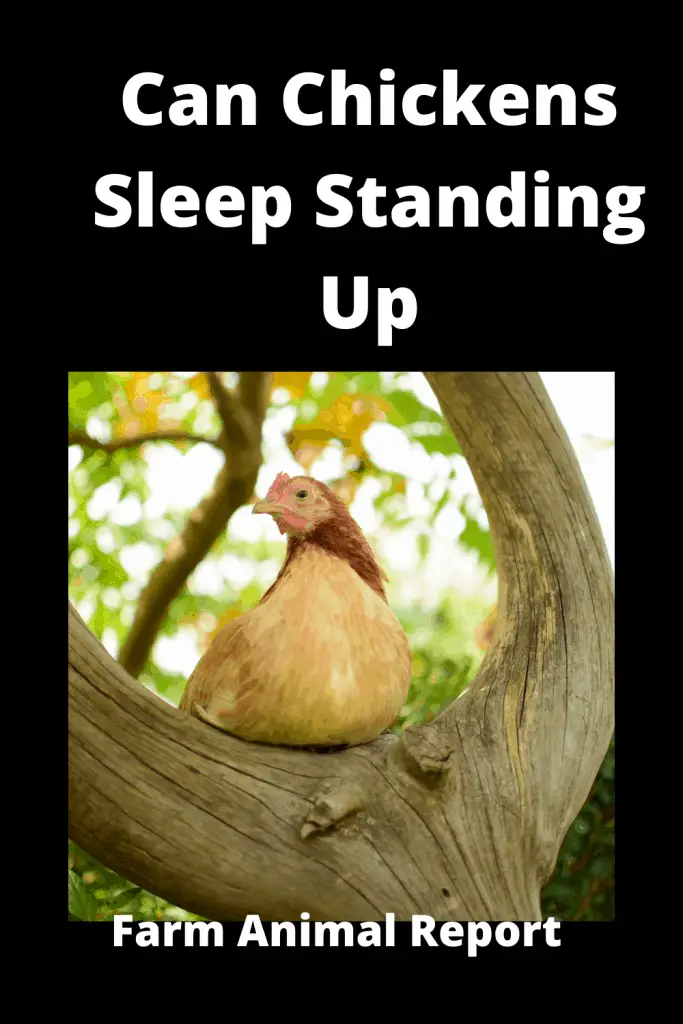
Domestic chickens will sleep in a coop or hen house where they will be dry and protected from predators.
If you are wondering how high you should place your roosting branch or stick, you must consider the height of your hen house. Chickens like to be as elevated as possible when they sleep. They want a clear vantage point, where they can feel secure.
How Long do Chickens Sleep?
How long chickens sleep, depends very much on the personality of each bird, and also the time of the year.
Some birds are naturally very light sleepers and wake at the slightest noise; others do not seem to have an established pattern where they might sleep only when they are tired from being busy. Others are more disciplined and will sleep at the same time and wake at the same time.
The consensus among chicken keepers is that chickens sleep on average 7 hours in the summer and possibly more in the winter.
The daylight determines a chicken’s daily schedule. If there is not any artificial light in their coop, they could go for a long night’s sleep until dusk and not wake until dawn the following day. In high latitudes, chickens can sleep around 15 to 16 hours per night.
During the winter reproduction goes down; however, egg-laying is not affected. Although shortened daylight in the fall, does reduce egg production, this can be problematic for the owner.
Chickens require around 15 hours of brightness for high yield egg production.
Some owners add a bulb into the coop for winter lighting as it does appear to guarantee continued egg laying throughout the darkest days.
Solar bulls are particularly effective because they are self-sufficient with energy and do not require access to a power outlet.
Where do Chickens Sleep in Coop?
Chickens sleep in the coop on perches. Perches are elevated, flat boards that chickens rest their feet on while sleeping. The chicken’s body heats up during the day and they will naturally want to cool down at night, so getting into a dark space with lower temperatures is preferable. Chickens fall asleep where ever they may be hanging out, so they don’t have a designated sleeping spot.
Of course, the ones that want to sleep in their coop will naturally do so by going up onto perches inside of it and snuggling into nesting material or bedding if there is any available for them to use. However, sometimes chickens get too hot during the day and won’t go into the coop at all where they would be able to get cooler. In this case, chickens will sleep in little nooks and crannies outside of the coop that is naturally shaded during the day or underneath trees. These are areas that are still cool but also near enough to their home so they can easily return back there if they want to.
Chickens Sleeping on Ground
Chickens generally do not sleep on the ground because they do not want to be vulnerable. However, if they are on the ground for too long, chickens may find it difficult to get back up on their feet due to sleeping in an awkward position.
They are prey animals and they try to stay away from the ground as much as possible.
They make their nest in a safe place, usually away from predators.
Chickens are Crepuscular
Chickens are crepuscular, meaning that they are most effective in the twilight hours between dusk and dawn.
Many chicken keepers prefer to train their birds to go into the coop, and onto their roosts, at the same time every night. It helps to choose an hour so that you can close the door of their coop at night. This method works for many farmers and their chickens.
Other chicken keepers have a rooster that will call the hens to the coop. Some hens are, however stubborn and will ignore him as they do not like the rooster telling them what to do. You could try to get your chickens to follow you into the coop at dusk; this generally works for some.
How long chickens sleep and what time chickens sleep depends upon the personality of each bird, but more so on the time of year and daylight determines their schedule.
Generally speaking, chickens will sleep when it is dark, they also like to take naps during the day, and the older they get, the more they nap.
There is no set time for chickens, what hours chicken sleep is up to each owner and their respective flock.
They are all different; some will sleep earlier than others; some are light sleepers; others love their sleep.
Instinctively chickens will sleep as soon as night falls and will be up when it is bright enough for them to start their day.
My Chicken is Trying to Sleep Standing
They all seem healthy, but they do not nestle down when going to sleep. They fall asleep while standing up and their heads slowly droop until it hits the ground. Then they slowly sink to the sitting position. This is not the condition worth worrying about, it is rather a curious condition. It is really cute, and when the doze turns to sleep, then they topple over.
Interestingly, chickens do the sleeping dozing behavior in the water dish. As soon as the chick sleeps, her beak would touch the water, and the chick will wake up and drink and fall asleep again. The chickens perform this act of sleeping approx five times and then fall asleep again until and unless they manage to sleep away from the water.
Basic Chicken Behaviours
Watching a flock of chickens can be as entertaining as watching teenagers at the mall. Chickens have very complex social interactions and a host of interesting behaviors. And like most domesticated animals, chickens prefer to be kept in groups. A group of chickens is called a flock.
Knowing a little about chicken behaviors is crucial for keeping chickens. Hopefully, knowing a little bit about chicken behavior may sway you if you are sitting on the fence trying to decide whether to raise chickens. Raising chickens is a fun hobby, even if you are raising them for serious meat or egg production. When the power goes out, you can go back to the times of your forefathers and raising chickens Naturally.
Patterns of Sleeping Chickens
When chickens sleep, they sleep. Total darkness makes the chicken go into a kind of stupor. They are an easy mark for predators at this point; they do not defend themselves or try to escape. Because they are very vulnerable when they sleep, chickens prefer to roost as high off the ground. The more street sway birds also pick a spot with overhead protection from the weather and owls.
Chickens like to roost in the same spot every night, so when they are used to roosting in your chicken coop, they will try to go back home at nightfall even if they have managed to escape that day or are allowed to roam.
Chickens Socializing Behaviour
With chickens, it’s all about family. If you do not provide chicken with a companion, they will soon make you part of the family. But chickens have very special and firm rules for all family or flock members. Chickens in the wild form small flocks, with 12 to 15 birds being the largest flock. Each wild flock has one rooster.
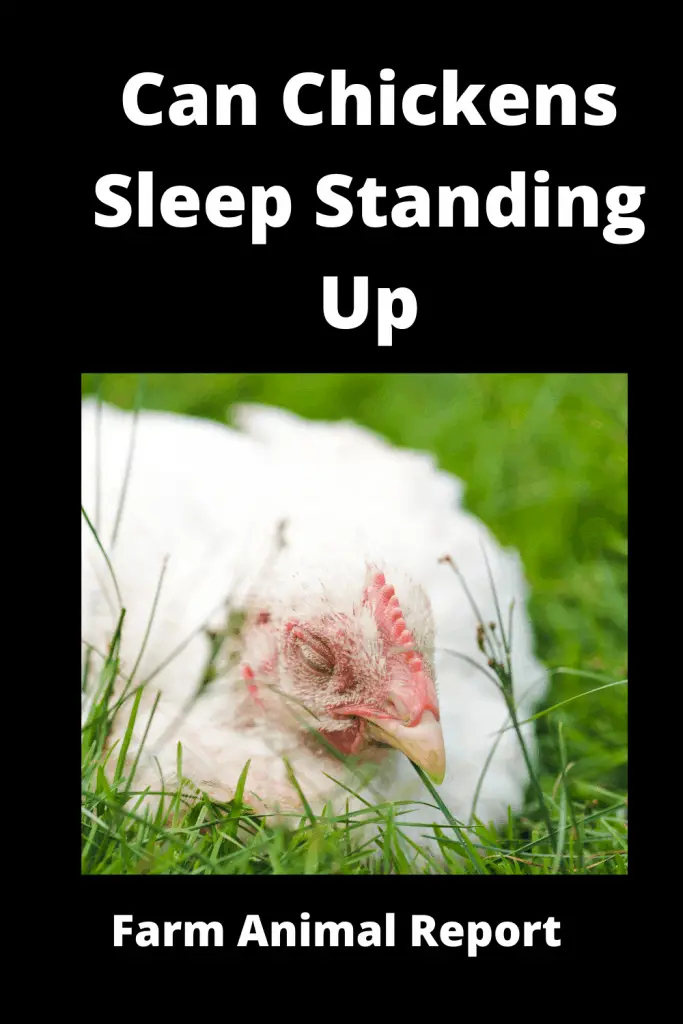
Ranking begins from the moment chickens hatch, to the point, whenever chickens are put together. Hens have their ranking system, separate from the roosters. Every member of the flock soon realizes its place, although some squabbling and downright battles may ensue during the ranking process. Small flock chickens make their life easier. In the large flock of 25 or more chickens and more than one rooster, fighting may periodically resume as both hens and roosters try to maintain the ‘’pecking order’’.
The Romance Between Hens and Roosters
Roosters have a limited rather courtship ritual, compared to some birds, and the amount of romance varies among individuals, too.
When a rooster wants to mate with the hen, he approaches her in a kind of tiptoe-like walk and may strut around her a few times. Usually, a hen approached this way is crouched down, and moves her tail to one side as a sign of submission. The rooster jumps on the hen’s back, holds on to the back of her neck with his beak, and rapidly thrusts his cloaca against her in a few minutes. He then dismounts, fluffs his feather, and walks away. Boastful crowing may also take place soon after mating, although crowing is just not reserved for mating.
The Celibate Hen – Living Without a Rooster
Hens do not need a rooster to complete their lives – or even to lay eggs, for that matter. A hen is hatched with all eggs she is ever going to have, and she will lay those eggs for as long as hens live, whether a rooster is around or not.
The number of eggs a hen lays over her lifetime varies by breed and individual. After the third year of life, though, a hen lays very eggs.
The hens are happier when the rooster is around. Because it fits a more natural family lifestyle of chickens. But hens are pretty self-sufficient, and if they have never known life with a rooster, they do not know what they are missing.
Bath Time For Chickens
Another interesting behavior of chickens is their bathing behavior. They do love getting wet, but they surely love a dust bath. Wherever the coop has loose soil, or even loose litter, on the floor, you will see chickens bathing.
Chickens scratch out a body-sized depression in the soil and lie in it, throwing the soil from the hole into their fluffed out feathers and then shaking to remove it. They seem very happy when doing this, so it must feel good. In nature, this habit helps to prevent parasites.
In the garden or lawn, these dust bath bowls can be quite damaging, but you cannot do much about it except put up a fence. If your chickens are confined all the time, they will appreciate a box of sand to bathe in. A DIY Dust Bath.
Family Sized Chicken Farm Egg Calculator
| Number of Chickens | Number of Eggs / Day | Number of Eggs / Week | Number of Eggs / Month | Number of Eggs / Year | Family Size | $ Value = .30 / Egg |
|---|---|---|---|---|---|---|
| 1 | .5 | 3.5 | 24 | 168 | 50.40 | |
| 2 | 1 | 7 | 28 | 336 | 1 | 100.80 |
| 3 | 1.5 | 10.5 | 42 | 504 | 151.20 | |
| 4 | 2 | 14 | 56 | 672 | 2 | 201.60 |
| 5 | 2.5 | 17.5 | 70 | 840 | 252.00 | |
| 6 | 3 | 21 | 84 | 1008 | 3 | 302.40 |
| 7 | 3.5 | 24.5 | 98 | 1176 | 352.80 | |
| 8 | 4 | 28 | 112 | 1344 | 4 | 403.20 |
| 9 | 4.5 | 31.5 | 126 | 1512 | 453.60 | |
| 10 | 5 | 35 | 140 | 1680 | 5 | 504.00 |
| 11 | 5.5 | 38.5 | 154 | 1848 | 554.40 | |
| 12 | 6 | 42 | 168 | 2016 | 6 | 604.80 |
| 13 | 6.5 | 45.5 | 182 | 2184 | 655.20 | |
| 14 | 7 | 49 | 196 | 2352 | 8 | 705.60 |
| 15 | 7.5 | 52.5 | 210 | 2520 | 756.00 | |
| 25 | 12.5 | 87.5 | 350 | 4200 | 1260.00 | |
| 50 | 25 | 175 | 700 | 8400 | 2520.00 | |
| 75 | 37.50 | 262.5 | 1050 | 12600 | 3780.00 | |
| 100 | 50 | 350 | 1400 | 16800 | 5040.00 |
Per Day / Per Week / Per Month / Per Year / Dollar Value
Rare Breed Chicken Farming
| Rare Breeds | Country of Origin | Eggs/Week | Average Weight | Price / Chicks |
|---|---|---|---|---|
| Black Penedesenca | Spain | 3-4 | 4-5lbs | $ 13.43 |
| Black Sumatra | Sumatra | 4 / Tinted in Color | 4lbs | $ 4.56 |
| Ameraucana | United States / Chile | 3 / 4 Blue | 5 lbs | $ 4.25 |
| Lavender Orpington | England | 4 / 5 Brown | 5 lbs | $ 6.08 |
| Partridge Chantecler | Canada | 3-5 / Brown | 7 lbs | |
| Wyandotte | United States | 3 - 5 / Tinted Brown | 6 lbs | $ 4.90 |
| Welsummer | Welsum Netherlands | 4 / Dark Brown | 5 lbs | $ 5.95 |
| Silver Grey Dorking | UK / Roman | 8 lbs | $ 5.95 | |
| Light Brahma | United States / China | Brown | 13 lbs | $ 4.90 |
| Silver Laced Cochin / Shanghai | China | 5-6 / Brown | 6 lbs | $ 4.90 |
| White Marans | Marans / France | 4 / Dark Brown | 5 lbs | $ 6.08 |
| Dominiques | United States | 4 - 5 / Brown | 7 lbs | $ 4.90 |
| Exchequer Leghorn | Tuscany Italy | White | 5 lbs | $ 4.25 |
| Silver Spangled Appenzeller Spitzhaubens | Switzerland | 5 | 4 lbs | |
| Buff Brahma Standard | Shanghai China | Brown | 13 lbs | $ 4.90 |
| Silver Laced Polish | Poland / Netherlands | 4-5 lbs | $ 5.95 | |
| White Sultan / Fowls of the Sultan | Turkey | 2 - 3 / White | 4-6 lbs | $ 7.75 |
| Mottled Houdan | Houdan Paris France | White | 4 - 5 lbs | $ 7.75 |
| Dong Tao / Dragon Chicken | Vietnam | 2/3 | $ 2500 - | |
| Ayam Cemani | Indonesia | 3 / Cream | 5 lbs | $ 50 - $ 2500 |
| Onagadori / Honorable Chicken | Japan | $ 49.00 | ||
| Polverara | Italy | 2 / 3 | ||
| Ixworth | Sussex UK | 4 / Cream | ||
| Naked Neck / Transylvanian Naked-Neck chickens. | Transylvania | 5 | $ 4.25 | |
| Campaign | Belgium | 7 / White | 5 lbs | $ 7.75 / Golden |
| Deathlayer / | German | 7 / White | $ 99.00 | |
| Serama / Smallest Chicken in the World | Thailand | .5 - 1 Lb | $ 39.00 | |
| Silkie / Silky | Chinese | 2 / Cream | $ 5.75 / White $ 5.75 / Blue $ 5.75 / Buff $ 5.75 / Black |
|
Types of Chicken Breeds
| Chicken Breeds | Origin | Meat/ Layers / Dual Purpose | Finished Weight | Eggs per Week | Weeks to Slaughter |
|---|---|---|---|---|---|
| Broilers | Canada/US/Europe | Meat | 3.3 lbs | 5 | 14 Weeks |
| Cornish crosses | England | Meat | 6.5 - 8.5 lbs | 3 | 8 - 9 Weeks |
| Jersey Giants | USA | Meat ( Intended to replace Turkeys) | 13 lbs | 4 | 8 - 9 Months |
| Hertigage Breeds | 6 - 9 months | ||||
| Delaware | USA Delaware | Duo | 6.5 lbs | 4 - large | 8 Months |
| Dorking | United Kingdom | Duo | 10 - 14 lbs | 5 - med | 5 Months |
| Buckeye | USA Ohio | Duo | 6 - 9 lbs | 4 - med | 5 Months |
| Rhode Island Red | USA Rhode Island | Duo | 6 b- 8 lbs | 5-6 | 5 Months |
| Leghorn | Italy | Eggs | 4 -5 lbs | 4 | 8 Months |
| Plymouth Rock | USA - Massachusetts | Duo | 7.5 lbs | 4 | 5 Months |
| Sussex | United Kingdom | Duo | 7 lbs | 4 - 5 - large | 5 Months |
| Wyandotte | Canada | Duo | 7 - 9 lbs | 5 Months | |
| Welsummer | Netherlands | Duo | 7 lbs | 4 / Week | 5 Months |
| Hamburg | United Kingdom | Eggs | 7 lb | 4 - med | 9 weeks |
| Black Australorp | Australia | Duo | \3 - 5 lb | 5 - med | 5 months |
| Buff Orpington | England | Duo | 7 - 8 Lbs | 4 - 5 | 8 months |
| Brahma | Meat | 11 lbs | 3 - med | 5 monthss |
Origin
Meat Breeds
Laying Breeds
Dual Purpose Breeds
Natural Foods for Free Range Chickens
| Insects They Love to Eat | Insects they will not eat |
|---|---|
| Earthworms | Elderbugs |
| Grasshoppers | Lady Bugs |
| Grasshoppers | Honey Bees |
| Ants | Wasp |
| Terminates | Bumble Bees |
| Grasses | Stink Bugs |
| Green Leafy | |
| Berries | |
| Hookworms | |
| Larvae | |
| Spiders | |
| Scorpions | |
| Beetles | |
| Spiders | |
| Grubs | |
| Mealworms | |
| Crickets | |
| Ticks | |
| Slugs | |
| Mayflies | |
| Parisite Eggs | |
| Gnats | |
| Cockroaches | |
| Japanese beetles | |
| Earwigs | |
| Butterflies | |
| Salamanders | |
| Tiny Lizards | |
| Tomatoe Worms | |
| Cabbage Worms | |
| Fleas | |
| Pill Bugs | |
| Amphids | |
| Misquitos | |
| Fly / Maggots | |
| Fire Ants |
Insects they will Eat
Insects they will not eat
Chicken / Poultry Breeder Associations
| Rabbit Association | Location | Link |
|---|---|---|
| US Poultry & Egg Association | United States | USPA |
| American Poultry Association | California | APA |
| Ohio Poultry Association | Ohio | OPA |
| National Chicken Council | United States | NCC |
| British Poultry Council | United Kingdom | BPCE |
| Poultry Club of Great Britain | United Kingdom | PCGB |
| Association of Poultry Breeders in EU | Europe | AVEC |
| Australian Chicken Meat Federation Inc | Australia | ACMF |
| Australian Poultry Hub | Australia | Poultry Hub |
Wild Chickens are Prey Animals they are most Valuable during sleeping Patterns and as Young Chicks

Wild chickens are prey animals, and they are most valuable during their sleeping patterns and as young chicks. Their value during these times allows predators to get a good meal, and also provides farmers with an easy way to raise chickens. When chickens are young, they are very vulnerable and can be easily killed by predators. During their sleeping patterns, they are much more difficult to catch and eat. As a result, wild chickens are most valuable during these two periods of their lives. Farmers who raise chickens can take advantage of this by protecting their flocks during these times, ensuring that they have a good supply of fresh eggs and meat. predators can also benefit by hunting wild chickens during these periods, when they are at their most vulnerable.
Why do Mother Hens Look For a Safe Place for Egg Production, Nesting Boxes, Roosting Perch, or Tree Branches?
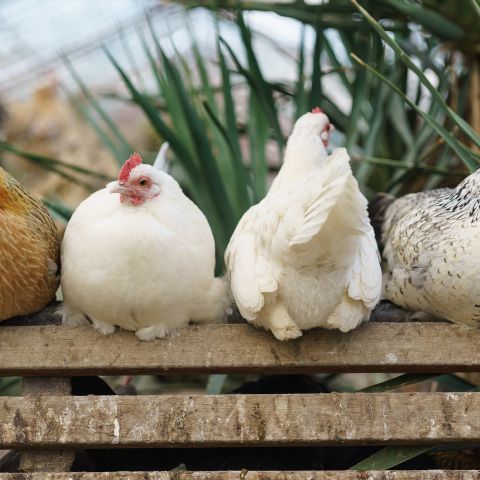
When a hen is ready to lay an egg, she will start to look for a safe place to do so. This is because, when she lays her egg, she will need to be able to sit on it until it hatches. If she is not in a safe place, she could be attacked by predators or other animals that would see her egg as a tasty treat. The most common places for hens to lay their eggs are in nesting boxes, on roosting perches, or in tree branches. All of these places provide the hen with a sense of safety and security, which is essential for her to be able to lay her egg successfully. Mother hens are incredibly protective of their eggs and will do everything they can to keep them safe. This is why it is important to provide them with a safe place to lay their eggs.


